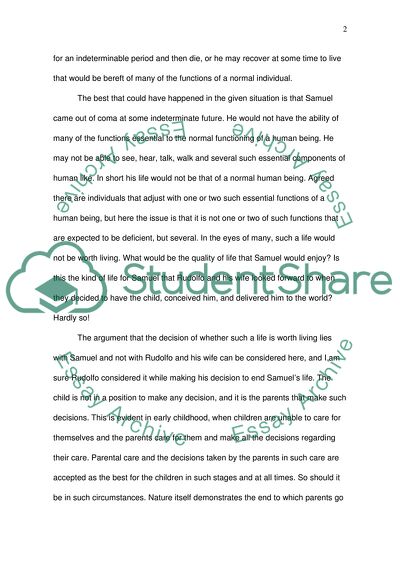
- Home
- Free Samples
- Premium Essays
- Editing Services
- Extra Tools
- Essay Writing Help
- About Us
- Studentshare
- Subjects
- Miscellaneous
- Euthanasia
Euthanasia - Essay Example

- Subject: Miscellaneous
- Type: Essay
- Level: Masters
- Pages: 4 (1000 words)
- Downloads: 0
- Author: ryleeorn
Extract of sample "Euthanasia"
It needs courage. The medical situation of the child Samuel was that the brain of the child was partially dead. He had remained in coma for nine months and the prognosis as hardly anything to look forward with only two options. He would remain in such a coma for an indeterminable period and then die, or he may recover at some time to live that would be bereft of many of the functions of a normal individual. The best that could have happened in the given situation is that Samuel came out of coma at some indeterminate future.
He would not have the ability of many of the functions essential to the normal functioning of a human being. He may not be able to see, hear, talk, walk and several such essential components of human like. In short his life would not be that of a normal human being. Agreed there are individuals that adjust with one or two such essential functions of a human being, but here the issue is that it is not one or two of such functions that are expected to be deficient, but several. In the eyes of many, such a life would not be worth living.
What would be the quality of life that Samuel would enjoy? Is this the kind of life for Samuel that Rudolfo and his wife looked forward to when they decided to have the child, conceived him, and delivered him to the world? Hardly so! The argument that the decision of whether such a life is worth living lies with Samuel and not with Rudolfo and his wife can be considered here, and I am sure Rudolfo considered it while making his decision to end Samuel’s life. The child is not in a position to make any decision, and it is the parents that make such decisions.
This is evident in early childhood, when children are unable to care for themselves and the parents care for them and make all the decisions regarding their care. Parental care and the decisions taken by the parents in such care are accepted as the best for the children in such
...Download file to see next pages Read MoreCHECK THESE SAMPLES OF Euthanasia
Voluntary euthanasia
Legalizing Euthanasia
Can Euthanasia Be Ethical Euthanasia: the Debate
Inevitability euthanasia
Euthanasia Law
Euthanasia Dilemma
Pediatric Euthanasia
Active Euthanasia

- TERMS & CONDITIONS
- PRIVACY POLICY
- COOKIES POLICY